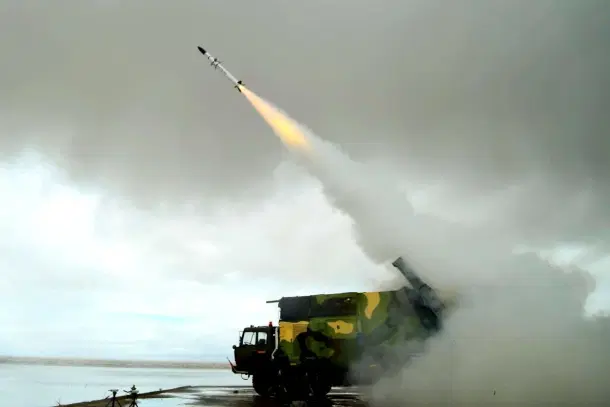Defence
India Opens Missile And Ammunition Manufacturing To Private Sector for Long-Term Firepower Readiness: Report
Swarajya Staff
Oct 05, 2025, 09:24 AM | Updated 09:24 AM IST
Save & read from anywhere!
Bookmark stories for easy access on any device or the Swarajya app.


In a significant policy shift, the Defence Ministry has allowed private companies to develop and manufacture missiles, artillery shells, and ammunition—ensuring India’s sustained firepower in prolonged conflicts, Hindustan Times reported.
The decision aligns with the government’s broader Atmanirbhar Bharat vision for defence self-reliance.
The government has reportedly amended the Revenue Procurement Manual (RPM), eliminating the need for private bombs and ammunition manufacturers to obtain a no-objection certificate (NOC) from Munitions India Limited (MIL) before setting up an ammunition unit.
Under the new framework, private firms can now produce a wide range of defence munitions—such as 105 mm, 130 mm, and 150 mm artillery shells, Pinaka missiles, 1000-pound bombs, mortar rounds, hand grenades, and small to medium calibre ammunition, HT reported, citing people familiar with the development.
Additionally, the Defence Ministry has reportedly informed the DRDO about its decision to involve private firms in missile development and integration.
The move stems from the need to expand production beyond the state-run Bharat Dynamics Limited (BDL), which alone cannot meet the growing operational demands of the armed forces.
According to the report, the missile sector has been opened to private players as Operation Sindoor has demonstrated that the future of warfare lies in long-range, stand-off weapon systems.
BDL and Bharat Electronics Limited (BEL) under DRDO are the sole manufacturers of missiles and surface to air missile systems such as Akash, Astra, Konkurs, Milan and also of torpedos.
Following Pakistan’s deployment of Chinese-origin long-range missiles and rockets during Operation Sindoor, the government reportedly believes it is crucial for Indian private enterprises to participate in conventional missile manufacturing.
Strategic missile projects, however, will remain under DRDO’s exclusive control.
Experts emphasise that future warfare will depend heavily on stand-off and anti-missile systems rather than traditional fighter jets.
India’s growing inventory of conventional missiles—BrahMos, Nirbhay, Pralay, and Shaurya—reflects this shift.
The point was underscored during Operation Sindoor when India’s S-400 air defence system reportedly neutralized a Pakistani ELINT aircraft over 300 km inside Punjab province on 10 May.
The Defence Ministry’s twin-sector liberalisation ensures that India’s armed forces maintain steady ammunition supplies even during extended conflicts.
The global arms market remains strained amid wars in Ukraine and Gaza, making last-minute foreign procurements costly.
Meanwhile, Pakistan continues to rely on China for its military needs—further motivating India’s drive for domestic production.
Please click here to add Swarajya as your preferred and trusted news source on Google
Also Read: Indian Army To Acquire Rs 30,000 Crore Indigenous ‘Anant Shastra’ QRSAM Air Defence System





